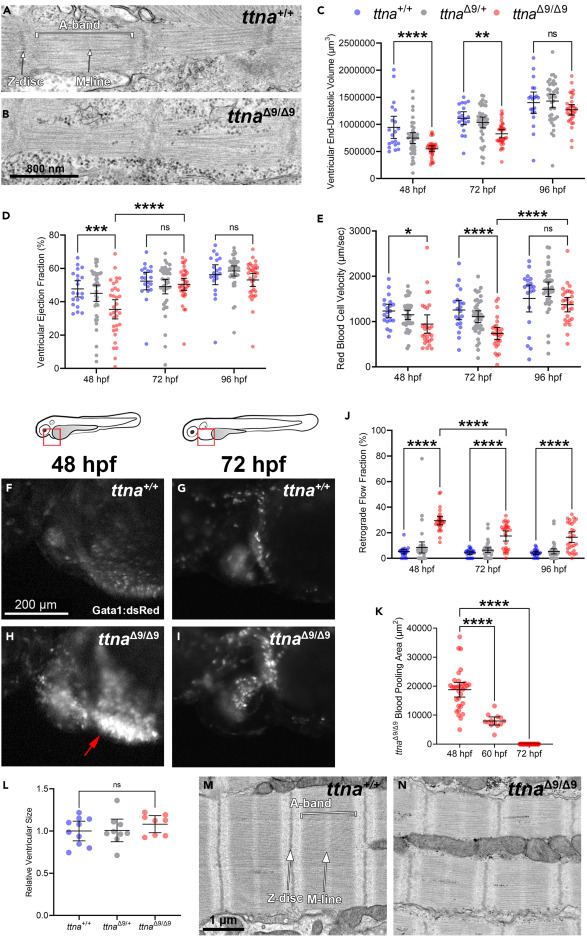Fig. 2 ttnaΔ9/Δ9 zebrafish exhibit a transient reduction in ventricular function during development (A and B) Representative transmission electron microscopy (TEM) images of sarcomeres in wild-type (ttna+/+, n = 2) and ttnaΔ9/Δ9 (n = 5) zebrafish embryonic cardiomyocytes at 48 hpf. (C–E) Quantification of ventricular end-diastolic volume (C), ejection fraction (D), and red blood cell velocity (E) for ttna+/+, ttnaΔ9/+, and ttnaΔ9/Δ9 embryos at 48, 72, and 96 hpf. (F–I) Representative images of wild-type and ttnaΔ9/Δ9 embryos’ blood flow in the inflow tract, visualized with the red blood cell-labeling transgenic line gata1:dsRed at 48 and 72 hpf. Red boxes indicate the location of the inflow tract, and red arrow indicates blood pooling. (J) Quantification of the blood retrograde flow fraction between the atrium and inflow tract for ttna+/+, ttnaΔ9/+, and ttnaΔ9/Δ9 embryos at 48, 72, and 96 hpf. (K) Quantification of blood-pooling area in the inflow tract of ttnaΔ9/Δ9 embryos at 48, 60, and 72 hpf. (L) 12–15-months-old ttna+/+ (n = 10), ttnaΔ9/+ (n = 9), and ttnaΔ9/Δ9 (n = 8) ventricular relative size. (M and N) Representative TEM images of sarcomeres in ttna+/+ (n = 3) and ttnaΔ9/Δ9 (n = 3) ventricular cardiomyocytes at 6 months of age. n value for (C–K): ttna+/+ n = 20, ttnaΔ9/+ n = 39, ttnaΔ9/Δ9 n = 33. Data in (C–E, J–L) are represented as mean ±95% confidence intervals. ns p > 0.05; ∗p < 0.05; ∗∗p < 0.01; ∗∗∗p < 0.001; ∗∗∗∗p < 0.0001. See also Figures S2 and S4 .
Image
Figure Caption
Acknowledgments
This image is the copyrighted work of the attributed author or publisher, and
ZFIN has permission only to display this image to its users.
Additional permissions should be obtained from the applicable author or publisher of the image.
Full text @ iScience

